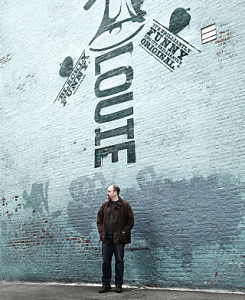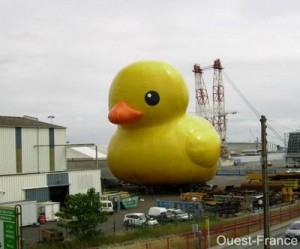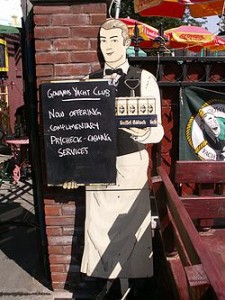 Louis C.K. is basically the patron saint of DadWagon: an angry, confused, profane, and frequently hilarious father; divorced and bitter and elated; infuriated and smitten with his children; and prone to smoking pot with the neighbors instead of exercising or paying attention to the kids. Or at least, that’s what his character is like on “Louie,” his fantastic show on FX, whose second season begins June 23.
Louis C.K. is basically the patron saint of DadWagon: an angry, confused, profane, and frequently hilarious father; divorced and bitter and elated; infuriated and smitten with his children; and prone to smoking pot with the neighbors instead of exercising or paying attention to the kids. Or at least, that’s what his character is like on “Louie,” his fantastic show on FX, whose second season begins June 23.
We’d like to be able to say that’s what he’s like in reality, too, but his publicist said he didn’t have time for an interview. So, to get something up on our site today, and to delight you, our beloved readers, we’ve simply made up his answers to the questions we would’ve liked to ask.
So, Louis, thanks for joining us imaginarily. Sorry you couldn’t be here in reality.
Yeah, sorry about that, too. I’ve kind of done all the publicity I can stand for the show already. Plus, I’ve never heard of you guys.
That’s all right. If we were you, we wouldn’t talk to us either. That said, here’s your first question: What’s funnier, marriage or divorce?
Really? That’s your first question?
What? Too straight for a fake interview?
Uh, yeah.
You’re right, but it lets me pontificate about the subject in your fake answer.
In that case, it all depends on whether you prefer your comedy to come from exasperation or anger. In marriage, whether a good one or a bad one, there’s some kind of love at the bottom of the jokes. It might be real love or it might be feigned, but it tempers the humor, makes it more observational. You are asking an audience to share your point of view, a global point of view, about the subject. Divorce jokes are angry jokes, and anger goes all over the place: at the ex, at the kids, at the legal system, at yourself. It’s got more energy, and that can be nice. But it’s also more narcissistic, more “Listen to my tale of woe!” And comedians are already narcissists, so maybe divorce is better for them. Me, I’m a whole lot fucking funnier now that I’m single.
Here’s something we think a lot about at DadWagon: how much to use our kids as source material. Your daughters’ lives are a major component of your act; have they ever asked to be kept out of it? At what point do you give them privacy?
Never. If they want to continue eating meals every day and wearing clean clothes (or, really, if their mother wants to keep receiving child support), I have to keep making money. And I make money by turning their embarrassments and miseries—like getting bitten by a pony—into ha-ha anecdotes that people pay me to tell at live shows. If the kids don’t like it, I know a good Chinatown brothel where they can go earn their keep. Actually, come to think of it, it’s not really a good one after all.
The other day, my wife and kid and I came home, and I pretended to be tired to get out of feeding or bathing the kid—so I could catch up on the first season of “Louie” on Hulu. Was that wrong?
Of course, but why should you care? The very fact that you were present for at least part of the time with your wife and kid makes you a hero in the eyes of the world. Also, you watching my show put money in my pocket, so I approve.
But in your Esquire interview, you’ve said you don’t earn anything from FX—you make most of your income from stand-up. So, if you’re making so much money doing standup, and “Louie” is all about total creative control, and making it is a personal expression, and the studio fuckers are all soulless robots attempting to murder your artistic impulses, and you don’t need them, and I repeat, you make serious “fuck you money,” and everyone else can go suck it, and David Letterman can’t take a joke, and all that shit… why make the show in the first place? What do you get out of FX that you couldn’t provide for yourself? Is it only the insurance, and camera dudes, and craft service handjobs, and all that nuts-and-bolts stuff that an actual network, albeit a small one, offers, or is it something else? Do you just enjoy the idea of having them over a barrel and propagating the myth of this completely unyielding creative spirit, who actually gets to win, and then ramming it down their throat? Cause if it’s that, fine. But I would ask, why use them at all? Why not start your own network, if you’re that huge, borrow some money from somewhere and start your own banana republic where TV execs shine your shoes, you are heroically videotaped naked, and Top Ten lists run like water in the streets?
I’m sorry, what was the question?
Let me rephrase: Why are you such a cocksucker?
Oh. Because I’m your father. That’s why. Now get me a beer.
Classic dad answer. I like it. Okay, final question: Babies in bars—yes or no?
They’ll probably get kicked out—stupid fucking babies—but as long as they’re not mine, I don’t give a damn.



